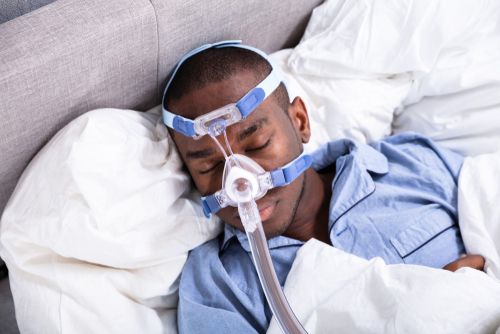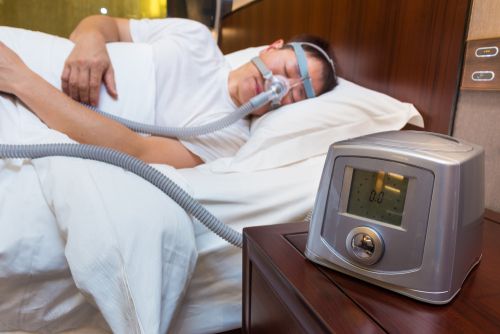 Written by Mike Price, OT
Written by Mike Price, OT
CPAP (continuous positive air pressure) machines are specialized devices that provide continuous air flow to patients during sleep. This continuous supply of air helps to prevent the patient’s airway from closing, thereby lessening the effects of sleep apnea. The devices are designed to run quietly at a prescribed level of airflow, which is provided through one of several types of CPAP masks.
Because of their valuable ability to treat the symptoms of sleep apnea, CPAP devices are extremely popular. People who use CPAPs have a varied range of needs and preferences, and because of this, the devices on the market are equally diverse.
While this large selection is wonderful news for patients suffering from sleep apnea, it may feel a bit intimidating when it comes to finding the right product for your needs. With that in mind, we'll help highlight some of the most important features and options to consider when shopping, so that you can more easily find the right CPAP machine for you.

CPAP machines are usually divided into three different types: Standard, Automatic, or BiPAP/VPAP. Each of these categories, however, can also contain a good amount of variation.
These devices use a fixed pressure through the entire cycle, which is typically based on your own medical sleep study. Once the pressure reaches its prescribed setting, it remains at that level throughout your entire sleep cycle. Although these devices are the traditional form of CPAP therapy, they can sometimes cause excessive dryness and difficulties breathing against the pressure.
These devices expand on the standard model by offering automatic pressure adjustment. They include a sensor that recognizes when an apnea event is about to occur and increases air pressure just enough to alleviate it. Then, after the apnea event has passed, the device reduces pressure again to a comfortable level. Because of this unique technology, APAPs have proven to be more comfortable and tend to more naturally mimic normal breathing.
The most sophisticated version of a CPAP, these devices are designed to provide different pressure settings for both the inhale and exhale cycle of breathing. Generally, these devices are reserved for people who cannot tolerate either a standard or automatic CPAP and need something with more adjustability or additional breath support. BiPAP/VPAP’s are available in both standard and auto-adjusting models, and can even be sophisticated enough to actually assist with breathing for patients with conditions like COPD.

When determining which CPAP best suits the needs of you or your loved one, there are a number of key considerations to make. Depending on your medical condition, your health, and specific needs and preferences of both you and anyone you cohabitate with, you may prefer certain options over others. In order to help you suss out these differences and make the right choice for your needs, we've laid out some of the most important features and options to consider.
One of the most important considerations to make regarding a CPAP machine is the amount of noise that the machine generates during its use. While most devices are designed to prevent excessive noise, some are more successful than others. This factor may be especially important for patients who are light sleepers or if the patient shares a bedroom with another person.
For patients who rely on a CPAP machine for a full night’s sleep, it’s important to remember that wherever you go, the CPAP machine will likely need to go too. This makes it crucial to consider how often you'll need to travel, the available space you have in any luggage you currently use, and the size/weight of any CPAP machine you consider.
CPAP machines often include humidifiers and heat settings to prevent patients from inhaling dry air all night. These features help to ensure patients avoid feeling “dried out” by the airflow.
While humidifiers and heat settings are featured on most CPAP machines, some products also provide level adjustments. These adjustable settings allow patients to set the humidity and temperature of the air to a level that they find most comfortable. The added ability to adjust these settings is notably popular among many patients and is definitely something you may want to consider before settling on a device.
Along with those listed above, there are a number of small but valuable features that might make one product preferred over another.
Because the range of features that may accompany CPAP machines is so diverse, we highly encourage that you thoroughly review the features of each product you are considering when making a purchase.

In general, CPAPs work by sending pressurized air through the nose and/or mouth to keep the throat from collapsing and getting closed off. This ensures that the throat stays open and the supply of oxygen the brain is continuous, allowing the user to sleep soundly through the night.
Ramp refers to a steady increase in air pressure. This allows a CPAP to start at a lower level and slowly rise over a set period of time until it reaches the intended pressure. Typically, this is used to help allow users to fall asleep before the highest pressure is reached, and is usually only necessary on a standard CPAP, as automatic CPAPs already keep air pressure low until a higher pressure is needed.
CPAP machines can last for approximately 20,000 hours or about 7-8 years of full-time use if properly cared for and maintained. However, CPAP technology has advanced so much in the last few years that a machine from five years ago may feel very outdated in comparison to newer models.
That being said, replacement will still not be necessary; these machines tend to last for quite a while. But, you may want to try a newer model if there are complaints you have about your current CPAP that you feel might be addressed by newer technology.
You can clean most parts of your CPAP with a soft cloth, warm water, and antibacterial dish soap, however, cleaning tools made specifically for CPAP machines are also available to make the job significantly easier. At least once per week, you should completely disassemble your CPAP machine and thoroughly clean all of the components. Clean more often if you have cold-like symptoms to prevent increased contamination of the equipment.
CPAP machines are an invaluable treatment method for people living with sleep apnea, and much like the people who use them, they come in all shapes and sizes with a wide variety of features, making it difficult to choose the right one for you just from a glance. Hopefully, however, through our tips you've come closer to feeling confident in your ability to choose the right CPAP for your unique lifestyle and needs.
Rehabmart is proud to offer a vast selection of CPAP machines, as well as various accessories and other helpful tools, provided by trusted medical equipment manufacturers such as Respironics, ResMed, and Drive Medical. So whether you are just browsing for a CPAP machine or placing your order, visit Rehabmart to find the right product for you.
>> Shop CPAP Machines <<
Co-Founder of Rehabmart and an Occupational Therapist since 1993. Mike has spent his professional career working in multiple areas of Occupational Therapy, including pediatrics, geriatrics, hand therapy, ergonomics and inpatient / outpatient rehabilitation. Mike enjoys writing articles that help people solve complex therapeutic problems and make better product choices.